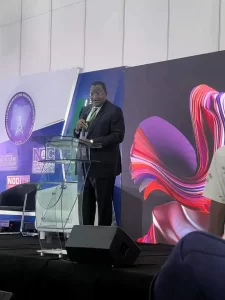The Nigerian government through the Nigeria Office for Developing the Indigenous Telecoms Sector (NODITS), which is domiciled in the Nigerian Communications Commission (NCC), yesterday in an attempt to strengthen indigenous participation in the telecom sector hosted the maiden edition of the Nigerian Telecommunications Indigenous Content EXPO (NTICE 2022).
The 2-day ongoing event happening at the Landmark Centre in Lagos is coming following the phenomenal growth in telecommunications with Nigeria seemingly playing more of the consuming role rather than producing.
Giving his welcome address at the event, which attracted participation from indigenous and international Information and Communications Technology players, the Executive Vice Chairman of the Nigerian Communications Commission (NCC), Prof. Umar Danbatta noted that the essence of the event is to promote indigenous companies and ultimately, enhance the local telecom sector.

“The essence of the Nigerian Telecommunications Indigenous Content EXPO (NTICE 2022) is to showcase indigenous content development in the telecoms sector,” he said.
He argued that the telecoms sector is the proverbial golden goose that lays the golden eggs, providing not only voice communication but broadband internet and data supporting industry and national security. Thus, opportunities that have been extended to promote indigenous content in the Oil & Gas, Agriculture, Power sector, Entertainment and Transportation sectors which are backed by special funding and financing regimes should be extended to the sector.
“Our gathering here today will not only showcase the strides been undertaken by indigenous telecoms companies but will discuss opportunities and pertinent issues relating to the industry from capacity development, funding and financing to policies and their effects on the ease of doing business,” he added.
Nigeria had formulated a National Policy for the Promotion of Indigenous Content in the Nigerian Telecommunications Sector, which was signed by President Muhammadu Buhari, on March 8, 2021.
The Policy has four focus areas, which include Manufacturing; Services & Software for the Telecoms Sector; People, and Research & Development for Digital Innovation & Entrepreneurship. It also provides for the creation of the Nigeria Office for Developing the Indigenous Telecoms Sector (NODITS) which is a Special Purpose Vehicle resident in the Commission.
The creation of NODITS to drive the provision of indigenous content for the telecom industry is not only apt but in line with the Nigerian Communications Act 2003.
Represented at the event are mobile telecoms companies, manufacturers of SIM cards, towers and mast, providers of services such as co-location, ISPs, local cloud and Data Center operators, metro and long-distance licensees, sales and installers of equipment as well as SMEs and innovators in the sector.
Meanwhile, Team Lead at NODITS, Engr. Babagana Digima said the NTICE Expo is focused on bringing stakeholders in the communications value-chain together, and providing a platform where practicable ideas and solutions can be evolved to stimulate the demand and supply of indigenous solutions, and technologies, human capacity and skills.
“We have invited indigenous operators, manufacturers, regulators, government agencies, policymakers, innovators, influencers, industry leaders, startups, academia and global experts to an exhibition to showcase their products and services, innovative solutions and new technologies that will help stimulate further growth of the Nigerian digital economy,” Digima said.

Also speaking, the Minister of Communications and Digital Economy, Prof. Isa Pantami, said the expo is timely as there is an urgent need to reduce the amount of importation in the country.
While tasking the Nigerian Communications Commission and industry stakeholders to implement the National Policy for the Promotion of Indigenous Content in the Nigerian Telecommunications Sector to the latter, the Minister argued that Nigeria cannot support its economy with so much importation.
“There is no way you can support your economy with too much importation. You have to significantly reduce importation. And this is one of the challenges we are encountering today when it comes to Forex,” he said.




